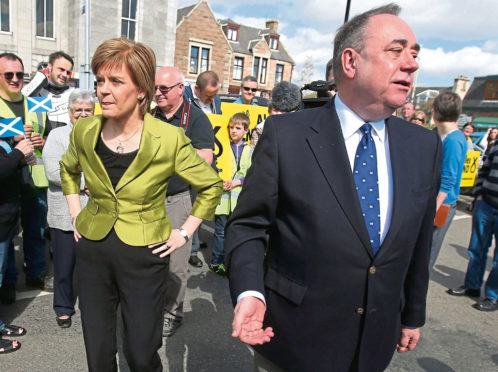In 2014 I was dead against Scottish independence. I found the case put by its advocates unconvincing and the White Paper produced by the SNP government a rambling, incoherent mess.
In its style, the Yes campaign too closely mirrored the arrogant toxic masculinity of its leader, Alex Salmond. As a columnist, I said as much and took my share of (often quite personal) abuse from those who had decided all No voters had the brains of Ron Burgundy, the morals of Prince Andrew and the intentions of Saddam Hussein. It goes with the territory, of course, but it was at times a grim and saddening experience.
I wondered then and wonder now what kind of people these aggressors are. They seem to exist at a constant pitch of fury. Does this rage spill over into their offline lives? Do they kiss their mothers and sing gentle lullabies to their children with those mouths? Is every setback in life – standing in dog poo, say, or accidentally turning the whites pink in the wash – met with the same splenetic ferocity?
But quite the worst thing was the sense that you were being “othered”. There was a deliberate attempt by Yes campaign leaders and their supporters to portray No voters as somehow less Scottish, and therefore less legitimate. This disgusting tactic was led from the front by Salmond, who split his countrymen and women into “Team Scotland” and “Team UK”.
There’s little room for sensitivity in the desperate heat of a political campaign, but still… I can feel my gorge rising even now.
In defeat, the smarter people in the SNP realised that, funnily enough, anger and contempt would only take them so far. Demonising at least half the population was neither likely to win a referendum nor, in the event of a narrow victory, form a sustainable basis for a new, united nation. Nicola Sturgeon has sought to be the anti-Salmond, detoxifying and feminising the offer, softening the tone, introducing greater realism and encouraging sceptics to take another look. She again struck the right tone in her conference speech yesterday.
It has worked pretty well. Support for independence today sits comfortably in the mid-50s, and her party is on course to win both a majority in May’s Holyrood election and a mandate for a second referendum. The surge has been driven by disillusioned Scots who voted No in 2014 and Remain in 2016, and who now see Westminster rule as incompatible with Scottish values and aspirations.
As someone who literally ticked both the No and Remain boxes, I understand the shift. I’ve been on something of a journey myself, to what is sometimes called “indy-curious”.
But even if I might thole the fiscal challenges, I keep bumping up against the same obstacles. Which team are potential converts being asked to join? Align with the drooling, rabid, English-hating cybernats who Sturgeon has semi-muzzled but who threaten to slip the leash at any point? Or with the hard-left fantasists who have come to dominate the Yes movement and who believe, with an equally deluded grasp of economics and human nature, that an independent Scotland would be some kind of eco-socialist paradise?
Or with the cabinet ministers who in speech after speech to SNP conference fell over themselves to stress the length and depth of their commitment to independence – “even as a foetus…”? The naked indy-lust displayed by the high command is a disconcerting reminder of the gap between the committed separatist and the rest, even those who are open to persuasion. For the diehards independence is existential: their political, cultural and ideological lodestone. It is the kind of obsession that once led a senior SNP minister to admit privately that they “would live in a cave if it meant Scotland could be independent.”
For swing voters, the ultimate decision will be based on a more nuanced and difficult calculation. It will not be about hatred of the UK, or loathing of Westminster. It will not be inspired by the sense Scotland is reclaiming its freedom after 300 years. It will not be on the basis Scots are better than anyone else, any more empathetic or moral or brilliant.
For most, their Yes vote would be accompanied by a sense of regret and loss, of a struggle between their competing identities and loyalties, and real trepidation about the future. They may not share the rapture with which the above-mentioned groups, who give every indication they would be bad winners, would greet independence day. The closer they get to their prize, the harder the SNP should think about these people. They are the ones who will decide, in the end. They are not other, they are Scotland.
